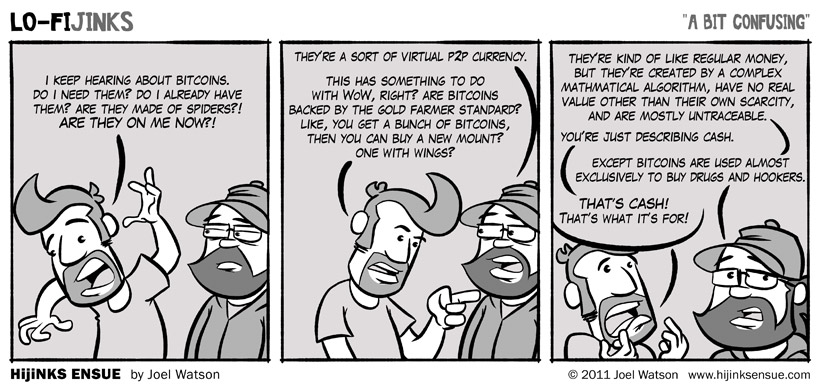It's theoretically possible that a place like MtGox or a coalition of fractional-reserve banks could stabilize the economy, but I'm too cynical to actually believe that people will cooperate like that. It's one reason why I own no bitcoins. I'm just sitting here defending cryptography and basic logic, which are useful in domains other than bitcoin.FrankTrollman wrote:Fiat Currency needs a monetary policy.
It was never intended to be a full currency. Think of it as a paypal replacement, sort of.Parthenon wrote:The fact that you will never be able to use bitcoins for day to day purchases or while physically shopping makes it half a currency.
Parthenon wrote:Wait a moment. How exactly can you separate 0.00001 of a bitcoin? Simplified, a bitcoin is a chunk of data digitally signed to one person. Does that mean that 0.01 BTC is 1% of that data chunk digitally signed? If so, which 1%?
I, a page and a half ago, wrote:First, instead of thinking about "a bitcoin", think about "a voucher for some number n of bitcoins, where n is any positive rational number". These vouchers can be infinitely combined and subdivided; for instance, this transaction takes three vouchers, combines them, and then splits the total into two vouchers that are then given to different people.
Bitcoins can be made completely anonymous, but by a slightly different method; basically, the line between "public" and "private" is drawn in a different place. Your current financial privacy line is drawn (by your bank's computer security) between your transactions and the public. People don't know how much money you have and what you're spending it on because they can't see your accounts. This can be verified by looking at what causes a failure in privacy: the bank releasing or losing your information, in which case everybody can see your account and transaction history.Parthenon wrote:Wait a moment. The whole privacy thing is borked.
Bitcoin, in comparison, draws the line between you and your money. Everybody can see all the transactions and all the bank accounts, but figuring out who owns which bank account can be made nearly impossible. This can be verified by looking at what causes a failure in privacy: if it's made public that you own own address 1EFQ4nJkmXojGS7rDbQBEMj6AEyMxLDfUB, for example, they can look it up in the block chain and see that you own exactly .02 bitcoins. Since you can have as many addresses as you want (most people I know use a different address for every single transaction, for example), all you have to do is make sure nobody can link any of your "real" addresses to addresses that have real-world information associated with them.
So don't buy food and rent with it. Use it to pay for webhosting, use it to pay for computers for your photoshop team, something like that.Parthenon wrote:until the owners of the porn websites realise they need to try and buy food and rent with it.
Entirely possible. I haven't spent any time studying economics, and in particular I haven't spent any time studying the economics of unusual systems like bitcoin.Murtak wrote:Inflate you mean?
Side channel attacks are implementation-dependent, so whoever said that was probably confused. Side channel attacks are things like measuring the CPU's power consumption during the computation or getting a virus onto the system doing the encryption and seeing how many operations it takes the system to encrypt a message. They do exist for most implementations of AES, but the only feasible one involves disrupting the computation to observe its behavior, and that in turn requires the ability to execute arbitrary code on the machine doing the encryption.Draco_Argentum wrote:I've heard some suggestion that NSA knows there are flaws in the implementations of AES that allow for side channel attacks. But nothing suggesting that the NSA was retarded enough to tell the US govt it was good enough to use whilst knowing of a flaw in the algorithm.
